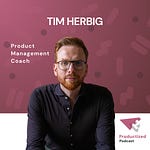In this episode of the Productized Podcast, host Pedro Ganço talks with Anya Cheng, an accomplished and award-winning product leader who transitioned from spearheading product initiatives at global giants like Facebook, eBay, Target, and McDonald’s to founding her own AI-powered menswear startup, Taelor. Anya shares her remarkable journey from launching cutting-edge features in fast-paced environments to bootstrapping her company with a single customer and scaling it through MVPs, gamification, and AI-driven personalization. As a TEDx speaker and mentor at 500 Startups, Anya’s insights are deeply valuable for product managers at any level seeking to master stakeholder management, lean experimentation, and sustainable innovation. Tune in to explore the intricacies of product strategy across corporate and startup landscapes and get inspired by actionable tips rooted in real-world experience.
In this episode, Anya covered:
How to transition from corporate product roles to startup founder.
Strategies for stakeholder alignment and autonomy in global organizations.
Practical applications of gamification and AI in product design.
Building MVPs that validate hypotheses with minimal resources.
Hiring and leading high-performance, diverse teams for innovation.
Some Takeaways from Anya:
Validate your product idea through low-cost MVPs before scaling. When Anya launched Taelor, she didn’t build an app or invest heavily upfront. Instead, she created a simple landing page and tested demand manually—even buying clothes on sale and shipping them herself to early users. This approach mirrors the startup philosophy behind Rent the Runway, whose founders initially tested market interest by emailing screenshots of dresses. These early actions allowed Anya to refine her value proposition and prove product-market fit without overcommitting resources.
Use stakeholder alignment frameworks to navigate complexity in large organizations. At McDonald’s, Anya had to align product development with global franchisees, each with unique needs and budgets. Her solution? Transparency through published selection criteria, such as focusing on margin growth or strategic user segments. She also encouraged cross-regional collaboration, merging similar needs (e.g., product authentication in Lisbon and Canada) into unified features that delivered mutual value. This proactive approach fostered alignment and reduced development cycles.
Recognize that autonomy comes with accountability. Anya contrasts her experiences at McDonald’s (less autonomy, but job security) versus Meta (high autonomy, but strict performance reviews). At Meta, product managers owned the P&L and had three to four months to show results or risk being let go. She emphasizes that both environments have trade-offs, and success hinges on knowing your strengths and preferences. Focus on solutions, not limitations, and adapt to the autonomy-accountability balance of your organization.
Gamification should be intentional and problem-driven, not just trendy. Anya warns against applying gamification or AI without clear user needs. For example, eBay’s AI-powered listing tool failed because sellers valued control and didn’t trust automation. Similarly, Amazon’s driver-assist AI misfired due to real-world usability gaps. Gamification works best when aligned with user motivations, such as Meta’s free Wi-Fi games in emerging markets, which doubled as brand exposure and service accessibility.
Team success hinges on role complementarity, not just individual brilliance. Anya stresses that building a championship team means assembling complementary skill sets—not just hiring "all-stars." At eBay, she strategically hired a growth expert, a monetization-focused banker, and a creative innovator to balance her team. This diversity fostered collaboration and innovation. As a leader, she also hires people better than herself in specific areas, minimizing blind spots and strengthening collective performance.
Sustainable innovation addresses both user experience and environmental impact. Taelor’s mission goes beyond fashion convenience. By allowing users to rent, wear, and return high-quality clothing, Anya tackles fast fashion waste. Her AI-styling ensures personalized recommendations, while the rental model reduces landfill contributions. This dual focus on customer delight and sustainability resonates with modern consumers and showcases how product strategy can serve larger societal goals.
Your greatest leadership asset is the ability to embrace uncertainty and create the future. Reflecting on her first job as a reporter, Anya attributes her comfort with uncertainty to investigative journalism. As product managers are essentially building the future, she believes that fearlessness and curiosity are crucial. Whether imagining a world with ChatGPT or launching a novel service like Taelor, success depends on embracing ambiguity and turning vision into impact.
🎉 Mark your calendars for the Productized Conference 2025! Join us in Lisbon for the 10th anniversary of this premier event, where PM leaders from around the world gather for great Talks, Masterclasses, Workshops, networking, and celebration. Tickets are already available—don’t miss out! Get your tickets now and benefit from great discounts: https://www.productized.co
Where to find Anya:
LinkedIn: https://www.linkedin.com/in/anyacheng/
Website: https://taelor.style
Topics covered in this episode:
[00:00] Introduction to Anya Cheng and her Product Journey
[03:00] Early Career Struggles and Lessons from Journalism
[06:00] Founding Taelor and Building AI-Powered Fashion Services
[09:00] Transition from Corporate to Startup Leadership
[14:00] Stakeholder Management at Scale
[20:00] Product Vision Alignment Across Global Teams
[28:00] Gamification and AI in Product Strategy
[33:00] Balancing Research and Shipping Speed
[37:00] Hiring and Building High-Performance Teams
[41:00] Motivation, Success Metrics, and Team Alignment
Referenced:
Taelor: https://taelor.style
Agile Methodology: https://en.wikipedia.org/wiki/Agile_management
MVP (Minimum Viable Product): https://en.wikipedia.org/wiki/Minimum_viable_product
Rent the Runway: https://www.renttherunway.com/
Gamification: https://en.wikipedia.org/wiki/Gamification
AI-Powered Product Recommendations: https://en.wikipedia.org/wiki/Recommender_system
McDonald’s Digital Products:https://www.forbes.com/sites/bernardmarr/2022/06/22/the-metaverse-and-digital-transformation-at-mcdonalds/
eBay: https://www.ebayinc.com/
Target Shopping App: https://www.mobilevillage.com/target-mobile-app-ipad/
Meta (Facebook): https://about.facebook.com/
A/B Testing: https://en.wikipedia.org/wiki/A/B_testing
Stakeholder Management: https://simplystakeholders.com/resources/guides/stakeholder-management/#:~:text=Stakeholder%20management%20is%20defined%20as,tasks%20to%20engage%20with%20them.
UX Design: https://en.wikipedia.org/wiki/User_experience_design
Lean Startup: https://en.wikipedia.org/wiki/Lean_startup
P&L Responsibility: https://www.linkedin.com/pulse/demystifying-pl-responsibility-what-really-means-business-nielsen-ukowf/
Growth Product Marketing: https://en.wikipedia.org/wiki/Growth_hacking
500 Startups: https://500.co/
TEDx Talks: https://www.ted.com/tedx
South by Southwest Conference: https://www.sxsw.com/












Share this post